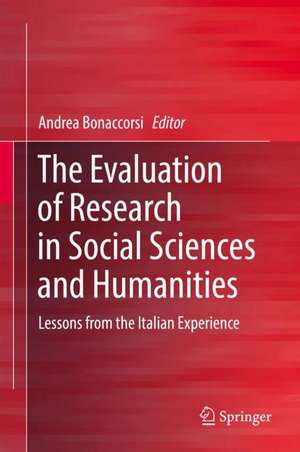The Evaluation of Research in Social Sciences and Humanities: Lessons from the Italian Experience
Editat de Andrea Bonaccorsien Limba Engleză Hardback – 15 ian 2018
| Toate formatele și edițiile | Preț | Express |
|---|---|---|
| Paperback (1) | 491.45 lei 39-44 zile | |
| Springer International Publishing – 6 iun 2019 | 491.45 lei 39-44 zile | |
| Hardback (1) | 658.30 lei 39-44 zile | |
| Springer International Publishing – 15 ian 2018 | 658.30 lei 39-44 zile |
Preț: 658.30 lei
Preț vechi: 866.18 lei
-24% Nou
Puncte Express: 987
Preț estimativ în valută:
125.100€ • 131.04$ • 105.59£
125.100€ • 131.04$ • 105.59£
Carte tipărită la comandă
Livrare economică 10-15 martie
Preluare comenzi: 021 569.72.76
Specificații
ISBN-13: 9783319685533
ISBN-10: 3319685538
Pagini: 422
Ilustrații: XX, 416 p. 61 illus., 39 illus. in color.
Dimensiuni: 155 x 235 mm
Ediția:1st ed. 2018
Editura: Springer International Publishing
Colecția Springer
Locul publicării:Cham, Switzerland
ISBN-10: 3319685538
Pagini: 422
Ilustrații: XX, 416 p. 61 illus., 39 illus. in color.
Dimensiuni: 155 x 235 mm
Ediția:1st ed. 2018
Editura: Springer International Publishing
Colecția Springer
Locul publicării:Cham, Switzerland
Cuprins
Chapter 1. Introduction: Towards an Epistemic Theory of Evaluation in Social Sciences and Humanities; Andrea Bonaccorsi.- Part I. Research Quality Criteria in SSH.- Chapter 2. Peer Review in Social Sciences and Humanities: Addressing the Interpretation of Quality Criteria; Andrea Bonaccorsi.- Chapter 3. Guidelines for Peer Review: A Survey of International Practices; Andrea Capaccioni and Gianna Spina.- Chapter 4. Individual and Department Level Indicators of Scientific Productivity: A Multisource Analysis; Chiara Faggiolani.- Chapter 5. Research Quality Criteria: The Case of Legal Studies; Sebastiano Faro, Ginevra Peruginelli.- Part II. The Role of Books and Monographs in Social Siences Research and Their Evaluation.- Chapter 6. Quality Evaluation of Online Library Catalogs, of Advanced Discovery Tools and of Liked Data Technologies; Maria Teresa Biagetti, Antonella Iacono, Antonella Trombone.- Chapter 7. Research Quality Criteria in the Evaluation of Books; Carla Basili, Luca Lanzillo.- Chapter 8. The Evolving Role of Books in Research Practices of Humanities; Tiziana Lippiello, Ioana Galleron, Geoffrey Williams.- Chapter 9. Research Quality Criteria in the Evaluation of Legal Research Monographs; Sebastiano Faro and Ginevra Peruginelli.- Part III. Journal Classification and Rating.- Chapter 10. Validity and Robustness of Journal Rating; Andrea Bonaccorsi, Tindaro Cicero, Antonio Ferrara and Marco Malgarini.- Chapter 11. Strategies for Publication in International Journals in SSH; Domenica Stella Iezzi.- Chapter 12. The Role of Scientific Societies of Journal Rating: the Case of Humanities; Andrea Bonaccorsi and Antonio Ferrara.- Part IV. Exploring New Indicators for the Multilevel Assessment of Research.- Chapter 13. Exploring the Potential of Indicators Based on Google Scholar; Alfio Ferrara and Silvia Salini.- Chapter 14. Assessing the Reliability and Validity of Google Scholars Indicators: the Case of Social Sciences in Italy; Ferruccio Biolcati-Rinaldi and Silvia Salini.- Chapter 15. Are Digital Library Catalgs a Reliable Source in Research Assessment?; Maria Teresa Biagetti, Antonella Iacono and Antonella Trombone.- Chapter 16. Do Scholar in Social Sciences and Humanities Contribute to the Third Mission of Universities?: Evidence from an Assessment Exercise; Brigida Blasi, Sandra Romagnosi and Andrea Bonaccorsi.- Chapter 17. The Impact of Research in SSH; Luca Lanzillo.- Part V. What Do We Learn from the Italian Experience?.- Chapter 18. The International Debate on the Evaluation of SSH and the Italian Experience; Alesia Zuccalà.
Notă biografică
Professor Bonaccorsi is an applied economist with a strong record of publications in the fields of economics of science, higher education, and quantitative research evaluation. He has pioneered the field of microdata on European higher education institutions (HEIs), started with the Aquameth and Eumida projects and culminated in the ETER platform, supported by Eurostat and DG EAC for the disaggregated analysis of individual HEIs in Europe.
He has been member of the RISE expert group, the leading group of economists supporting the European Commissioner for Research. He has been member of the Board of ANVUR in the period 2011-2015.
Textul de pe ultima copertă
This book examines very important issues in research evaluation in the Social Sciences and Humanities. It is based on recent experiences carried out in Italy (2011-2015) in the fields of research assessment, peer review, journal classification, and construction of indicators, and presents a systematic review of theoretical issues influencing the evaluation of Social Sciences and Humanities. Several chapters analyse original data made available through research assessment exercises. Other chapters are the result of dedicated and independent research carried out in 2014-2015 aimed at addressing some of the debated and open issues, for example in the evaluation of books, the use of Library Catalog Analysis or Google Scholar, the definition of research quality criteria on internationalization, as well as opening the way to innovative indicators. The book is therefore a timely and important contribution to the international debate.
Caracteristici
Examines very important issues in research evaluation in the Social Sciences and Humanities Presents a systemic review of theoretical issues influencing the evaluation of Social Sciences and Humanities Paints a broad and colorful picture of the Italian research assessment and its debate in Italy from many disciplines
